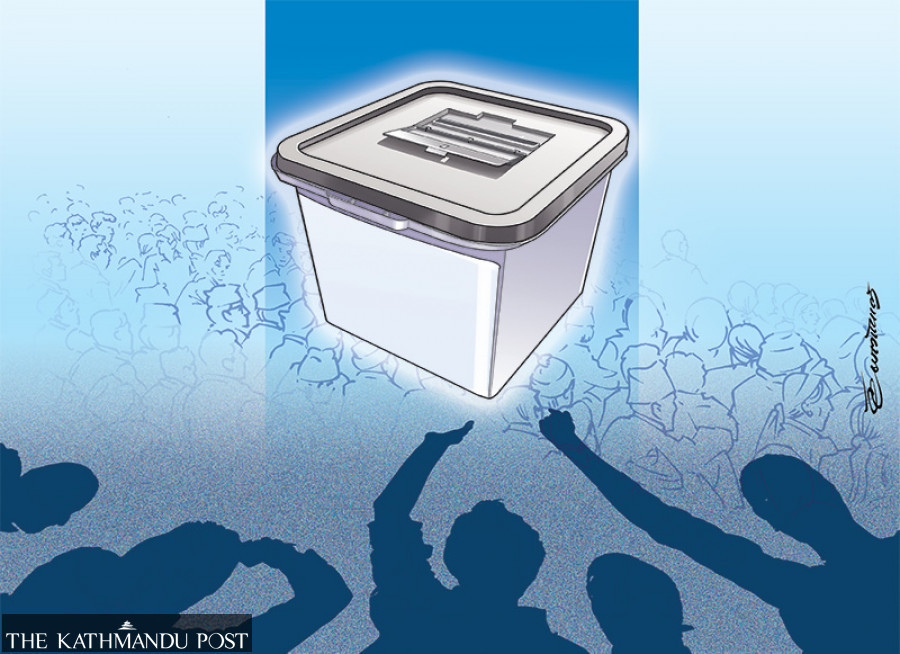National
Nepali politicians are big on promises but short on delivery
Observers see disconnect between politicians and people, as leaders barely heed citizens’ basic concerns.
Anup Ojha
In 2017, Sarita Sigdel exercised her franchise for the first time. For her, it was a momentous day, as elections were taking place for the first time after the promulgation of the new constitution in 2015. After casting her vote in local elections, first in 20 years, she voted in the provincial and parliamentary elections as well.
“I vote for those whose promises I found people-centric,” said Sigdel, 42, who runs a small grocery shop in Damauli, the district headquarters of Tanahun. “Of the many promises made by politicians, I found those which sounded people-centric, the ones that talked about us commoners.”
2022 is going to be an election year. Politicians will go to the people like Sigdel once again and make more promises.
Sigdel says she does not know which politician or party to trust. “Since voting is citizens’ responsibility, I will vote, but I don’t know who,” said Sigdel. “First of all, citizens should know why they are voting for a particular politician or a party.”
Sigdel wonders why politicians do not remember people or talk about—or with—them between the two elections.
The 2017 elections gave a strong mandate to CPN-UML chair KP Sharma Oli. After his party’s merger with the Communist Party of Nepal (Maoist Centre) to form the Nepal Communist Party (NCP), Oli became the strongest prime minister Nepal had seen in the last 30 years—with the full mandate to govern for a full term.
But it failed to last for more than three and a half years. Infighting led to the fall of the government. Currently, Nepali Congress President Sher Bahadur Deuba is leading a coalition government.
The coalition stands on such fragile ground that politicians are fully devoted to saving it, with no one having time to talk about people’s basic concerns—water, electricity, health and justice among others.
Sigdel says much of the last five years she has heard politicians only talking about themselves.
“We the people vote them to power, but they never have time to talk about us,” she said.
This, however, is not a new trend and Nepali politicians ever since the restoration of democracy in 1990 have been making big promises during elections and doing precious little.
Observers say it will be wrong to say Nepal has not achieved anything over the last three decades or so but admit that there has been a disconnect between politicians and the people. According to them, politicians in Nepal have developed a penchant for selling big dreams ever since the restoration of democracy in Nepal in 1990.
While party manifestos do talk about education, health, employment, water and electricity, among others, politicians barely talk about these basic things that concern people after the elections.
In 1994, late Nepali Congress leader Krishna Prasad Bhattarai announced during his election campaign that if voted to power, his government would wash Kathmadu’s streets with water from Melamchi. It took more than 30 years for the project to see the light of the day and it is not yet fully completed.
Erstwhile prime minister KP Sharma Oli who was in power for a little over three years since the 2017 elections was never tired of peddling incredibly ambitious ideas like operating a Nepali ship in the Pacific and Indian oceans or bringing a train from China.
Analysts say a democracy means government by the people, of the people for the people, but in Nepal, the people component goes completely missing once politicians are voted to power.
“There is a stark difference between what politicians say to achieve power and after achieving power,” said Rajendra Maharjan, a political commentator. “The reason politicians have failed to pick up public concerns is that they are continuously engrossed in fulfilling their own interests.”
According to Maharjan, money and power have become the name of the game for Nepali politicians.
“For a majority of Nepali politicians, people are just votes,” said Maharjan. “Appeasing the commoners with big dreams for votes and failing to even remember them after the elections is political corruption.”
If what Nepali politicians have been saying for long were to be believed, Nepal now would have become Singapore or Switzerland. Development is what every politician talks about, but that is too broad a term, analysts say. According to them, to win people’s trust, politicians should behave like “leaders”, those who lead, and for that to happen, they need to “talk” to the people.
Kundan Aryal, a media practitioner who has served as Oli’s press advisor when he was prime minister, said politicians in Nepal are largely stuck with their vested interests.
“Political parties have an assumption that their source of power is conspiracy and geopolitics, not the people,” said Aryal.




 11.12°C Kathmandu
11.12°C Kathmandu.jpg)














